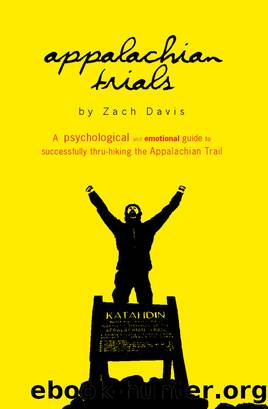Appalachian Trials by Zach Davis

Author:Zach Davis
Language: eng
Format: epub
Tags: backpacking, hiking, pacific crest trail, appalachian trail, sports psychology, thruhike, long distance backpacking
Publisher: Zach Davis
Sometimes a positive mindset is hard to maintain. After a tough day at work, a fight with a loved one, or other form of unexpected bad news, oneâs mind has a tendency to head into a dark place. You should all but expect unexpected bad news on the trail.
The methods mentioned previously in this chapter are frames of mind. I realize that itâs difficult to get back into a good place without actively doing something to make this happen. If switching from a negative frame of mind to a positive were as easy as reminding yourself that âchallenges are opportunities,â world peace would have been achieved by now.
Sometimes action is required to remedy the negative body chemistry that comes from an unforeseen hardship. Some turn to drugs, alcohol, food, sex and so on. Not only are these much harder to come by on the trail, but they ultimately compound the issue(s) at hand. Some choose to talk their issues out with others, and while this can be beneficial, you also risk it backfiring if your confidantes are going through similar difficulties. You can sink further into a hole.
What are we left with? Exercise? You already do that, a lot.
For me, meditation was a cure-all.
There is no shortage of benefits from meditation. âNeuroscientists have found that [those who meditate] shift their brain activity to different areas of the cortex â brain waves in the stress â prone right frontal cortex move to the calmer left frontal cortex. This mental shift decreases the negative effects of stress, mild depression and anxiety. There is also less activity in the amygdala, where the brain processes fear.â [30]
Additional claims of meditationâs benefits include an enhanced immune system, cured headaches, increased energy, decreased muscle tension and more.
So what do I mean by meditation?
The American Psychological Association defines meditation as the following:
Meditation is used to describe practices that self-regulate the body and mind, thereby affecting mental events by engaging a specific attentional set.... regulation of attention is the central commonality across the many divergent methods.
Even by this definition, itâs clear that meditation has a variety of meanings, but a central component involves the âregulation of attentionâ. In order to accomplish this, one needs to find a setting with limited distractions.
What better place void of distraction than the middle of the woods?
The following are meditation methods I used while on the trail. They represent a variety of meditation/spiritual readings Iâve done over the years. Itâs in your best interest to research meditation literature for yourself, as I do not claim any expertise. [31]
In all, meditation sessions should take about thirty minutes to an hour. If youâre having trouble harnessing your attention when first starting out, try shorter durations, maybe ten to fifteen minutes. As is the case with anything else, the more you practice, the easier it becomes.
I can assure you that I was horrible at meditating when first starting out (years ago). Itâs normal to get caught up in the repetition of your thoughts. Donât get discouraged if/when this happens.
Download
This site does not store any files on its server. We only index and link to content provided by other sites. Please contact the content providers to delete copyright contents if any and email us, we'll remove relevant links or contents immediately.
Machine Learning at Scale with H2O by Gregory Keys | David Whiting(4289)
Never by Ken Follett(3929)
Harry Potter and the Goblet Of Fire by J.K. Rowling(3841)
Unfinished: A Memoir by Priyanka Chopra Jonas(3368)
Fairy Tale by Stephen King(3365)
The Man Who Died Twice by Richard Osman(3060)
Will by Will Smith(2899)
Rationality by Steven Pinker(2346)
It Starts With Us (It Ends with Us #2) by Colleen Hoover(2324)
Can't Hurt Me: Master Your Mind and Defy the Odds - Clean Edition by David Goggins(2317)
The Dark Hours by Michael Connelly(2299)
The Storyteller by Dave Grohl(2215)
Friends, Lovers, and the Big Terrible Thing by Matthew Perry(2211)
The Dawn of Everything: A New History of Humanity by David Graeber & David Wengrow(2185)
The Becoming by Nora Roberts(2183)
The Stranger in the Lifeboat by Mitch Albom(2109)
Cloud Cuckoo Land by Anthony Doerr(2085)
Love on the Brain by Ali Hazelwood(2053)
Einstein: His Life and Universe by Walter Isaacson(2000)
